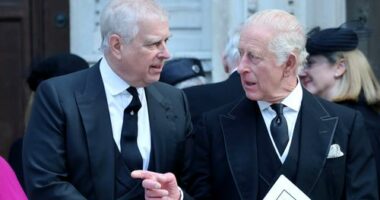Share this @internewscast.com
In a startling development, U.S. President Donald Trump declared that Venezuelan President Nicolás Maduro has been apprehended and removed from Venezuela, following a significant military operation led by U.S. forces. The operation, described by Trump as “a large-scale strike,” marks a critical turning point in U.S.-Venezuela relations.
This military action, which unfolded on January 3, 2026, signifies a major escalation in the ongoing tension between the two nations, following months of heightened pressure from the Trump administration on Maduro’s government.
In recent weeks, the U.S. Central Intelligence Agency executed a drone strike within Venezuela, while the U.S. military intercepted two tankers transporting Venezuelan oil in international waters, further intensifying the situation.
READ MORE: Trump announces capture and removal of Venezuela’s president and first lady
Simultaneously, U.S. forces have been actively targeting alleged drug trafficking operations in South American waters. Since early September, there have been 35 recorded strikes, resulting in at least 115 casualties, as reported by the Trump administration.
This aggressive stance is underscored by the deployment of the largest U.S. naval presence in the region in decades, showcasing the administration’s commitment to its objectives in Venezuela.
The White House said the US was in "armed conflict" with drug cartels to halt the flow of narcotics into the United States, while US officials alleged that Maduro supports the international drug trade. The authoritarian president faces charges of narco-terrorism in the US.
Maduro insists the real purpose of the US military operations has been to force him from power.
READ MORE: Teen arrested in US in alleged ISIS-inspired attack plot intended for New Year's Eve
Here is a timeline of the US military actions, concerns among some politicians and the response in Venezuela:
Jan. 20, 2025
Trump signs an executive order that paves the way for criminal organisations and drug cartels to be named "foreign terrorist organisations." They include Tren de Aragua, a Venezuelan street gang.
The US intelligence community has disputed Trump's central claim that Maduro's administration is working with Tren de Aragua and orchestrating drug trafficking and illegal immigration into the US.
Feb. 20
The Trump administration formally designates eight Latin American crime organisations as foreign terrorist organisations.
The label is normally reserved for groups like al-Qaida or the Islamic State that use violence for political ends — not for profit-focused crime rings.
Aug. 19
The US military deploys three guided-missile destroyers to the waters off Venezuela.
The naval force in the Caribbean grows within weeks to include three amphibious assault ships and other vessels, carrying about 6000 sailors and Marines and a variety of aircraft.
The US deploys F-35 fighter jets to Puerto Rico in September, while a Navy submarine carrying cruise missiles operates off South America.
Sept. 2
The US carries out its first strike against what Trump says was a drug-carrying vessel that departed from Venezuela and was operated by Tren de Aragua.
Trump says all 11 people on the boat were killed and posts a short video clip of a small vessel appearing to explode in flames.
Sept. 10
In a letter to the White House, Democratic senators say the Trump administration has provided "no legitimate legal justification" for the strike.
Senator Jack Reed of Rhode Island, the top Democrat on the Senate Armed Services Committee, says in a floor speech that week that the US military is not "empowered to hunt down suspected criminals and kill them without trial".
Sept. 15
The US military carries out its second strike against an alleged drug boat, killing three people.
Asked what proof the US has that the vessel was carrying drugs, Trump told reporters that big bags of cocaine and fentanyl were spattered all over the ocean. However, images of what Trump described were not released by the military or the White House.
Sept. 19
Trump says the US military carried out its third fatal strike against an alleged drug-smuggling vessel. Several senators and human rights groups continue to question the legality of the strikes, describing them as a potential overreach of executive authority.
Oct. 2
Trump declares drug cartels to be unlawful combatants and says the US is now in an "armed conflict" with them, according to a Trump administration memo obtained by The Associated Press.
The memo appears to represent an extraordinary assertion of presidential war powers and draws criticism from some lawmakers, including Republican Senator Rand Paul of Kentucky.
Oct. 3
Defence Secretary Pete Hegseth says he ordered a fourth strike on a small boat he accuses of carrying drugs.
Oct. 8
Senate Republicans vote down legislation that would have required the president to seek authorisation from Congress before further military strikes.
Oct. 14
Trump announces the fifth strike against a small boat accused of carrying drugs, saying it killed six people.
Oct. 15
Trump confirms he has authorized the CIA to conduct covert operations inside Venezuela and says he is weighing carrying out land operations in the country.
He declines to say whether the CIA has authority to take action against Maduro.
Oct. 16
The Navy admiral who oversees military operations in the region says he will retire in December.
Admiral Alvin Holsey became leader of US Southern Command only the previous November, overseeing an area that encompasses the Caribbean and waters off South America. Such postings typically last three to four years.
Oct. 16
Trump says the US struck a sixth suspected drug-carrying vessel in the Caribbean, killing two people and leaving two survivors who were on the semi-submersible craft.
The president later says the survivors would be sent to Ecuador and Colombia, their home countries, "for detention and prosecution". Repatriation avoided questions about what their legal status would have been in the US justice system.
Oct. 17
The US military attacks a seventh vessel that Hegseth says was carrying "substantial amounts of narcotics" and associated with a Colombian rebel group, the National Liberation Army, or ELN. Three people are killed.
Oct. 20
Representative Adam Smith, top Democrat on the House Armed Services Committee, calls for a hearing on the boat strikes.
"Never before in my over 20 years on the committee can I recall seeing a combatant commander leave their post this early and amid such turmoil," Smith said in a statement of Holsey's impending departure. "I have also never seen such a staggering lack of transparency on behalf of an Administration and the Department to meaningfully inform Congress on the use of lethal military force."
Oct. 21
Hegseth says the US military launched its eighth strike against an alleged drug-carrying vessel, killing two people in the eastern Pacific.
The attack marks an expansion of the military's targeting area to the waters off South America where much of the cocaine from the world's largest producers is smuggled.
Oct. 22
Hegseth announces the ninth strike, another in the eastern Pacific, saying three men are killed.
Oct. 24
Hegseth orders the US military's most advanced aircraft carrier, the USS Gerald R Ford, to the region in a significant escalation of military firepower.
Oct. 24
Hegseth says the military conducted the 10th strike on a suspected drug-running boat, leaving six people dead.
Oct. 27
Hegseth says three more strikes were carried out in the eastern Pacific, killing 14 people and leaving one survivor.
Hegseth says Mexican authorities "assumed responsibility for coordinating the rescue" of the sole survivor, who is presumed dead after Mexico suspended its search.
Oct. 29
Hegseth says the US military carried out another strike on a boat he said was carrying drugs in the eastern Pacific, killing all four people aboard in the 14th attack.
Oct. 29
Senator Mark Warner, the ranking Democrat on the Senate Intelligence Committee, says the Trump administration briefed Republicans — but not Democrats — on the boat strikes.
The Senate at the time was facing a potential vote on a war powers resolution that would prohibit strikes in or near Venezuela without congressional approval.
Oct. 31
UN human rights chief Volker Türk calls for an investigation into the strikes, in what appeared to be the first such condemnation of its kind from a United Nations organisation.
Ravina Shamdasani, a spokeswoman for Türk's office, relayed his message at a briefing: "The US must halt such attacks and take all measures necessary to prevent the extrajudicial killing of people aboard these boats."
Nov. 1
Hegseth announces the 15th known strike, saying three people were killed.
Nov. 4
In the 16th known strike, Hegseth posts on social media that two people were killed aboard a vessel in the eastern Pacific.
Nov. 6
Hegseth announces the 17th known strike, which killed three people.
Senate Republicans vote to reject legislation that would have limited Trump's ability to order an attack on Venezuelan soil without congressional authorisation. Lawmakers from both parties had demanded more information on the strikes, but Republicans appeared more willing to give Trump leeway to continue his buildup of naval forces.
Nov. 9
The US military strikes two vessels in the eastern Pacific, killing six people, according to an announcement from Hegseth the following day.
Nov. 10
The 20th known strike on a boat accused of transporting drugs kills four people in the Caribbean, according to a social media post from the US military's Southern Command.
Nov. 11
Venezuela's government launches what it says is a "massive" mobilisation of troops and volunteers for two days of exercises prompted by the US military buildup.
Defence Minister Vladimir Padrino López asserts that Venezuela's military is "stronger than ever in its unity, morale and equipment".
Nov. 15
Three people are killed after the US military conducts its 21st strike on an alleged drug-smuggling boat in the eastern Pacific, according to a post from Southern Command a day later.
Nov. 16
The Ford arrives in the Caribbean, a major moment in the Trump administration's show of force.
The aircraft carrier's arrival brings the total number of troops in the region to about 12,000 on nearly a dozen Navy ships in what Hegseth has dubbed "Operation Southern Spear".
Nov. 16
Trump says the US "may be having some discussions" with Maduro and "Venezuela would like to talk", without offering details.
"I'll talk to anybody," Trump said. "We'll see what happens."
Dec. 4
Admiral Frank "Mitch" Bradley appears for closed-door classified briefings at the Capitol as lawmakers begin investigating the strikes. The investigation began following reports that Bradley ordered a follow-on attack that killed the survivors of the first strike on September 2 to comply with Hegseth's demands.
Republican Senator Tom Cotton later tells reporters that "Bradley was very clear that he was given no such order, to give no quarter or to kill them all".
Democrats say they found the video of the entire attack disturbing.
Washington Representative Adam Smith, the top Democrat on the House Armed Services Committee, says the survivors were "basically two shirtless people clinging to the bow of a capsized and inoperable boat, drifting in the water — until the missiles come and kill them".
Dec. 4
Four people are killed in the 22nd strike on an alleged drug-smuggling boat in the eastern Pacific, according to a post from Southern Command.
Dec. 10
The US seizes an oil tanker off the coast of Venezuela after the ship left that country with about 2 million barrels of heavy crude.
Attorney General Pam Bondi says the tanker was involved in "an illicit oil shipping network supporting foreign terrorist organisations". Venezuela's government says the seizure "constitutes a blatant theft and an act of international piracy".
Dec. 15
The US military strikes three alleged drug-smuggling boats, killing eight people, in the eastern Pacific Ocean, Southern Command announces.
Dec. 16
Hegseth says the Pentagon will not publicly release unedited video of the September 2 strike that killed two survivors, even as questions mount in Congress about the attack and the overall campaign near Venezuela.
Dec. 16
Trump says he's ordering a blockade of all "sanctioned oil tankers" going into and out of Venezuela, a move that seems designed to put a tighter chokehold on the South American country's oil-dependent economy.
Trump alleges that Venezuela is using oil to fund drug trafficking, terrorism and other crimes and vows to continue the military buildup until the country returns to the US oil, land and assets, though it's unclear why the president feels the US has a claim.
Dec. 17
The US military says it attacked a boat accused of smuggling drugs in the eastern Pacific Ocean, killing four people.
House Republicans rejected a pair of Democratic-backed resolutions that would have put a check on Trump's power to use military force against drug cartels and Venezuela. They were the first votes in the House after Senate Republicans previously voted down similar war powers resolutions.
Dec. 18
The US military says it conducted two more strikes against boats that were allegedly smuggling drugs in the eastern Pacific, killing five people.
Dec. 20
Homeland Security Secretary Kristi Noem says the US Coast Guard, with help from the Defense Department, stopped a second oil tanker off the coast of Venezuela.
Dec. 22
Trump confirms that the US Coast Guard is chasing another oil tanker that the administration describes as part of the "dark fleet".
The US military says it attacked a boat accused of smuggling drugs in the eastern Pacific Ocean, killing four people.
Dec. 29
Trump tells reporters the US struck a facility where boats accused of carrying drugs "load up". He declines to say if the US military or the CIA carried out the strike on the dock or where it occurred. He does not confirm it happened in Venezuela.
The US military says it attacked a boat accused of smuggling drugs in the eastern Pacific Ocean, killing two people.
Dec. 30
The CIA was behind the drone strike at a docking area believed to have been used by Venezuelan drug cartels, according to two people familiar with details of the classified operation who requested anonymity to discuss it.
It is the first known direct operation on Venezuelan soil since the US began strikes in September. Venezuelan officials have not acknowledged the strike.
Dec. 30
The US military strikes three more boats that were allegedly smuggling drugs, killing three people in the first boat while people from the other two boats jumped overboard and may have survived, US Southern Command announces the following day.
Dec. 31
The US imposes sanctions on four firms operating in Venezuela's oil sector and designates four additional oil tankers as blocked property and part of the larger shadow fleet that is evading US sanctions on Venezuela.
Dec. 31
The US military says it attacked two more boats, killing five people who were allegedly smuggling drugs along known trafficking routes.
Jan. 3
Multiple explosions rock Caracas in the early hours of the morning; Trump confirms the US has launched "large-scale strike against Venezuela and its leader".
Venezuelan President Nicolás Maduro and his wife are captured and removed from the country.


















